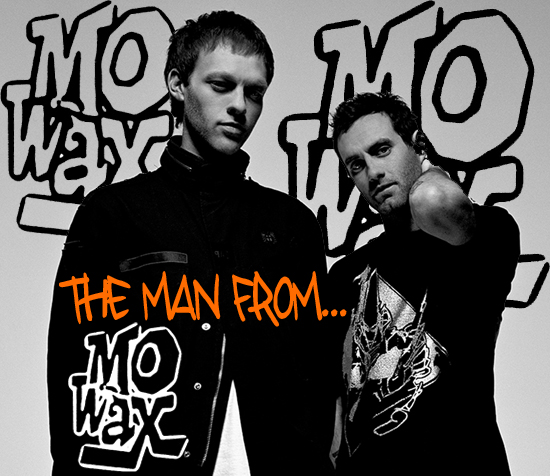MO'WAX MAN In 2015 when director Guy Ritchie turned sixties TV spy series, The Man From Uncle into a Hollywood comedy for the big-screen, one of the taglines was: Saving the world never goes out of style. In the world of dance music, where new genres and labels appear and then vaporise with the rapidity of an agent’s semi-automatic firearm, the opposite is usually true. Nineties record label Mo’Wax - which alongside bands Massive Attack and Portishead spearheaded the universal rise of trip hop, DJ-as-musician and turntablism as an album art form - has faired better than many. A quick revisit of DJ Shadow’s highly extolled breakthrough album Endtroducing is proof enough of that. It’s remains the label’s crowning glory and is perhaps its halcyon epoch. Alongside Tim Goldsworthy who went on to form LCD Soundsystems’ record company DFA, the man behind the Mo’Wax label was James Lavelle, the subject of a new documentary called The Man From Mo’Wax which premieres in Australia this month at the Sydney Film Festival. As the film’s director Matthew Jones explains, James Lavelle qualifies as an interesting feature film protagonist for a number of reasons. “James’ history is so rich,” says Jones from the studio of his Capture Film company in North London. “His story in some ways mirrors the music industry. He embodies the music industry’s ups and downs. The music industry… is this kind of background, pernicious monster in our film.” Lavelle himself is no monster, though he does prove to be a highly driven and somewhat uneasy character, if not something of a “bulldog”. His reported falling out with DJ Shadow (a.k.a. Josh Davis) is not only the relationship we see collapsing on screen.
“I think there was a combination of being wary and also being keen at the same time,” says Jones about Lavelle’s enthusiasm for a project that was a decade in the making. Alongside DJ Shadow who was an integral part of the UNKLE band early on, Lavelle provided the filmmakers with invaluable personal video footage and archival photos, much of which has never been seen by the public. “It’s incredibly exciting and flattering I’m sure if someone says I want to make a feature film about your entire life and career… but at the same time, from day one we said we wanted to make it warts ’n’ all. When he knew we were going into those territories, I’m sure there was a lot of trepidation in his mind, but trust is built and built. You know, when you spend nine years with someone off and on, and you’re not ripping them off to begin with - you’re there for the long haul - [it builds] trust… I think gradually he learned to accept that we were making a really great piece of independent cinema about his life. “James is a film lover,” continues Jones, which was lucky for the director and his team: producers M.J. McMahon (Kings Speech), A. Hoffman (Corked) and editor Alec Rossiter. “He’s got fantastic taste. His whole thing is about seeing what’s going to be great, before it has become commercially known about. He’s a great cultural divining rod.” Hence, Jones’ documentary was originally called Artist & Repertoire, a title that neatly encompasses what some might argue are Lavelle’s main talents: Facilitator, and creative conduit. Lavelle is a man who has foreseen coming waves and signed those on the cusp. An ideas man who oversees recordings, he has also blurred the line between artist and record producer, whilst bringing together the right people to create something fresh and lasting. In the film we see this working both beautifully (Radiohead’s Thom Yorke coaxed out to Star Wars director George Lucas’ ranch to create UNKLE’s trademark tune Rabbit In Your Headlights) and not so well, as when collaborative relationships turn sour, studio arguments ensue and early friends are ignored as fame and fortune grow. Like many music documentaries it’s a familiar story arc that details a rise and eventual fall. In Lavelle’s defence, successes came extremely early. He was already a tastemaker in his teens and by 21 a millionaire. Yet Lavelle seems to be the master of reinvention, repeatedly dusting himself off and preparing for the next adventure. “A lot of the more dark times James has come through have been the result of not just the things he’s done, but also wider industry trends that he’s never really been in control of,” says Jones. That’s what made his story special. The [other] thing that separates James from the pack is that there aren’t many other people who start out making a record label and then become the artist on that record label and have a career that lasts nearly three decades. It’s not only that he discovered some great artists along the way, he’s come from an A&R background and become the artist himself. Again, that’s kind of unique. Also the things he did around the record label in terms of creating a culture, it was so different and ahead of its time. Things like doing trainer collaborations with Nike… amazing vinyl packages… art shows. All these things make Lavelle… an incredibly interesting individual who warrants a film.” Like the Mo’Wax label, stylistically and aesthetically Jones’ film is interesting. Film editor Alec Rossiter’s contributions are an important ingredient. “He came with several great ideas in terms of trying to treat our archive [footage] like DJ Shadow would treat samples,” says Jones of Rossiter. Effects, like simulating vinyl scratching for film chapter segues, or the dusty nature of record digging visually, further contextualise what you see on screen within the obsessive, audio-focussed world of DJ culture. “I wanted to tell a human story about the excesses of the 90’s music scene and the long term effects of a DJ lifestyle, whilst also making a film which was really positive, uplifting and championed the go-getter, anything-is-possible philosophy of James Lavelle.” Jones has achieved what he set out to do in this highly watchable portrayal of the man from both Mo’Wax and UNKLE. With cameos from Ian Brown (Stone Roses) DJ Krush, Badly Drawn Boy, Joshua Hommes (Queens Of The Stone Age), Grandmaster Flash, Gilles Peterson and former graphic artists for Mo’Wax, Massive Attack’s 3D and Futura 2000, the film charts Lavelle’s rise from childhood (Lavelle’s mother providing some early childhood clues to his somewhat obsessive personality) to his comeback in 2014 as artistic director of London’s Meltdown Festival. It’s here that we leave Lavelle, filling the shoes left vacant by luminaries like Yoko Ono, David Bowie, Elvis Costello and Ornette Coleman, and wonder what he might do next. THE MAN FROM MO’WAX SCREENS AT THE SYDNEY FILM FESTIVAL ON FRIDAY JUNE 17 AND SATURDAY JUNE 18. BOOKINGS FROM SFF
Interview/story by: Paris Pompor |
Groovescooter
Records e: info at groovescooter.com
© 1999 groovescooter. site by antenna media

